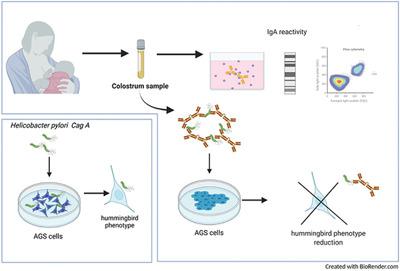当前位置:
X-MOL 学术
›
Eur. J. Immunol.
›
论文详情
Our official English website, www.x-mol.net, welcomes your
feedback! (Note: you will need to create a separate account there.)
Colostrum IgA1 antibodies recognize antigens from Helicobacter pylori and prevent cytoskeletal changesin human epithelial cells
European Journal of Immunology ( IF 4.5 ) Pub Date : 2021-08-16 , DOI: 10.1002/eji.202049117 Shantal Lizbeth Baltierra-Uribe 1 , Alejandra Montañez-Barragán 1 , Héctor Romero-Ramírez 1 , Ksenia Klimov-Kravtchenko 1, 2 , Karla Ivette Martínez-Pedro 1, 3 , Erick Sánchez-Salguero 1 , Margarita Camorlinga-Ponce 4 , Javier Torres 4 , Leopoldo Santos-Argumedo 1
European Journal of Immunology ( IF 4.5 ) Pub Date : 2021-08-16 , DOI: 10.1002/eji.202049117 Shantal Lizbeth Baltierra-Uribe 1 , Alejandra Montañez-Barragán 1 , Héctor Romero-Ramírez 1 , Ksenia Klimov-Kravtchenko 1, 2 , Karla Ivette Martínez-Pedro 1, 3 , Erick Sánchez-Salguero 1 , Margarita Camorlinga-Ponce 4 , Javier Torres 4 , Leopoldo Santos-Argumedo 1
Affiliation

|
Helicobacter pylori is a Gram-negative bacterium found on the luminal surface of the gastric mucosa in at least 50% of the world's human population. The protective effect of breastfeeding against H. pylori infection has been extensively reported; however, the mechanisms behind this protection remain poorly understood. Human IgA from colostrum has reactivity against H. pylori antigens. Despite that IgA1 and IgA2 display structural and functional differences, their reactivity against H. pylori had not been previously determined. We attested titers and reactivity of human colostrum-IgA subclasses by ELISA, immunoblot, and flow cytometry. Colostrum samples from healthy mothers had higher titers of IgA; and IgA1 mostly recognized H. pylori antigens. Moreover, we found a correlation between IgA1 reactivity and their neutralizing effect determined by inhibition of cytoskeletal changes in AGS cells infected with H. pylori. In conclusion, colostrum-IgA reduces H. pylori infection of epithelial gastric cells, suggesting an important role in preventing the bacteria establishment during the first months of life. As a whole, these results suggest that IgA1 from human colostrum provides protection that may help in the development of the mucosal immune system of newborn children.
中文翻译:

初乳 IgA1 抗体识别幽门螺杆菌抗原并防止人上皮细胞的细胞骨架变化
幽门螺杆菌是一种革兰氏阴性细菌,存在于世界上至少 50% 的人口的胃粘膜腔表面。母乳喂养对幽门螺杆菌感染的保护作用已被广泛报道;然而,这种保护背后的机制仍然知之甚少。来自初乳的人 IgA 对幽门螺杆菌抗原具有反应性。尽管 IgA1 和 IgA2 显示出结构和功能差异,但它们对幽门螺杆菌的反应性以前尚未确定。我们通过 ELISA、免疫印迹和流式细胞术证明了人初乳 IgA 亚类的滴度和反应性。来自健康母亲的初乳样本具有更高的 IgA 滴度;和 IgA1 主要被识别幽门螺杆菌抗原。此外,我们发现 IgA1 反应性与其通过抑制感染幽门螺杆菌的AGS 细胞的细胞骨架变化所确定的中和作用之间存在相关性。总之,初乳-IgA 减少了胃上皮细胞的幽门螺杆菌感染,表明在生命的最初几个月防止细菌滋生方面发挥重要作用。总的来说,这些结果表明来自人类初乳的 IgA1 提供了可能有助于新生儿粘膜免疫系统发育的保护。
更新日期:2021-08-16
中文翻译:

初乳 IgA1 抗体识别幽门螺杆菌抗原并防止人上皮细胞的细胞骨架变化
幽门螺杆菌是一种革兰氏阴性细菌,存在于世界上至少 50% 的人口的胃粘膜腔表面。母乳喂养对幽门螺杆菌感染的保护作用已被广泛报道;然而,这种保护背后的机制仍然知之甚少。来自初乳的人 IgA 对幽门螺杆菌抗原具有反应性。尽管 IgA1 和 IgA2 显示出结构和功能差异,但它们对幽门螺杆菌的反应性以前尚未确定。我们通过 ELISA、免疫印迹和流式细胞术证明了人初乳 IgA 亚类的滴度和反应性。来自健康母亲的初乳样本具有更高的 IgA 滴度;和 IgA1 主要被识别幽门螺杆菌抗原。此外,我们发现 IgA1 反应性与其通过抑制感染幽门螺杆菌的AGS 细胞的细胞骨架变化所确定的中和作用之间存在相关性。总之,初乳-IgA 减少了胃上皮细胞的幽门螺杆菌感染,表明在生命的最初几个月防止细菌滋生方面发挥重要作用。总的来说,这些结果表明来自人类初乳的 IgA1 提供了可能有助于新生儿粘膜免疫系统发育的保护。











































 京公网安备 11010802027423号
京公网安备 11010802027423号